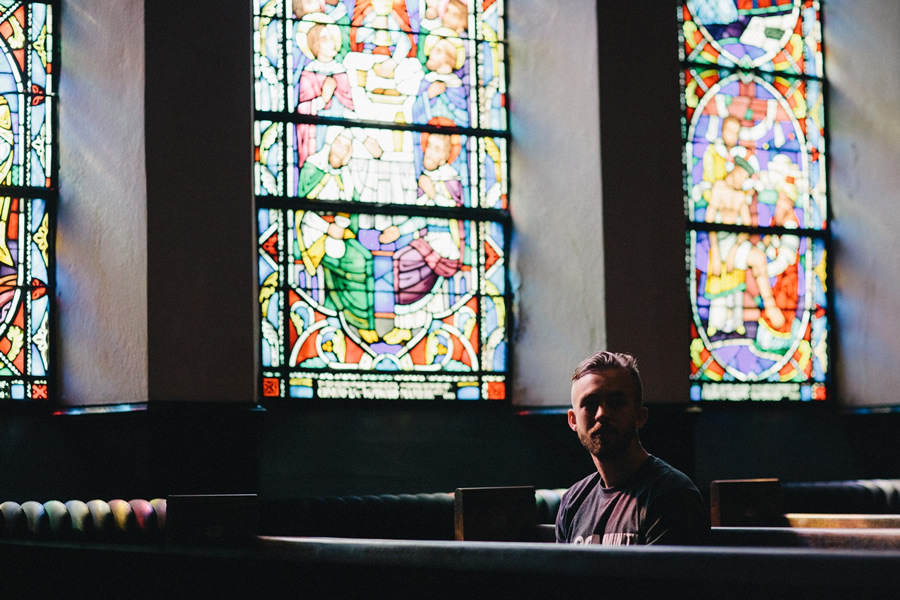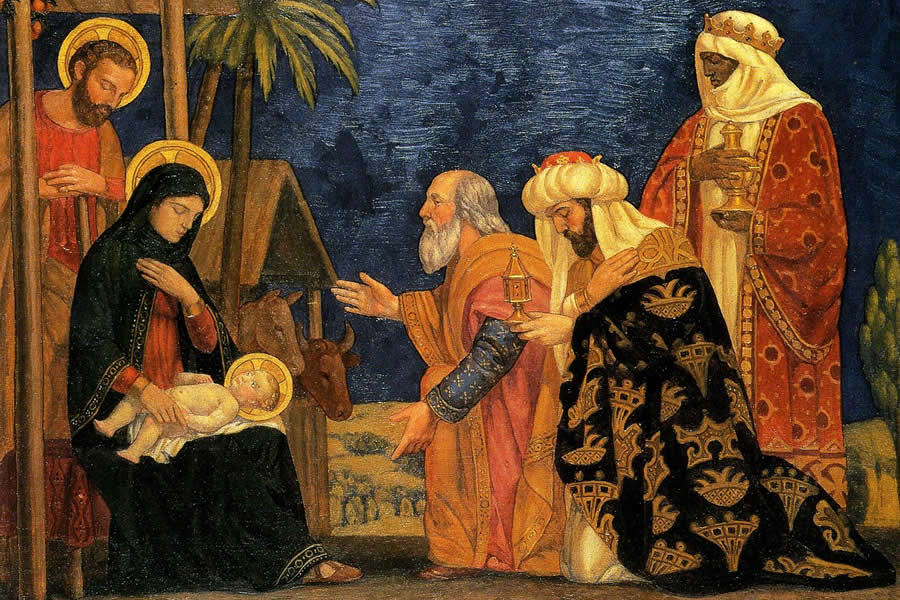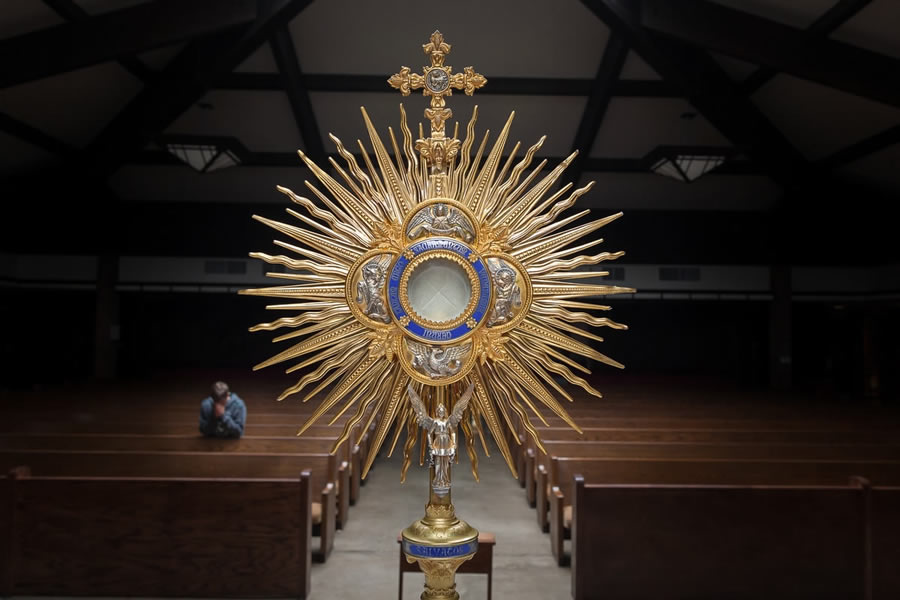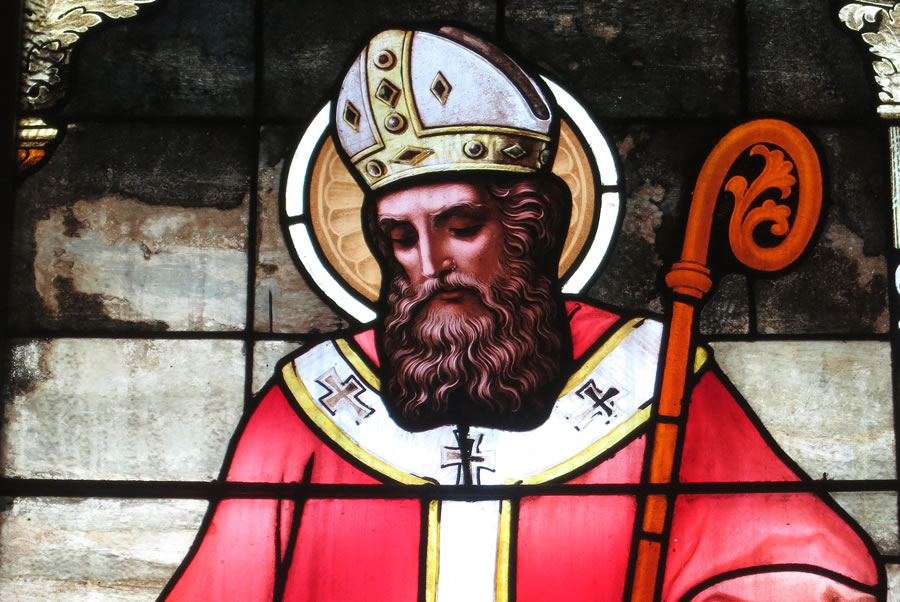Corpus Christi Blog

St. John Bosco -- Father and Teacher of Youth
01-28-2018Weekly ReflectionChristi DegThis Wednesday, January 31, we celebrate the feast of St. John Bosco. Many in the parish may recognize his name from St. John Bosco Catholic School here in Ahwatukee, but fewer may be familiar with his life.
He was born in Italy as Giovanni Melchiorre Bosco on August 16, 1815 to a poor family of farmers during a time of famine and drought. His father, Francis, passed away when John was only two years old, leaving his mother, Margherita, to raise John and his two older brothers on her own.
Even though the family was very poor, John learned the importance of charity through the example set by his mother. She would often give food and other assistance to the homeless and others in need. She was a tender-hearted woman with a devout faith. Those who knew her referred to her as “Mama Margherita.”
READ MORESacraments - our first line of defense against evil
01-28-2018HomiliesFr. Chad KingEven though it is not a popular belief today or topic in some churches; let me be clear from the beginning- Satan does exist. In fact, one of the tactics of the Devil is to get others to believe he doesn’t exist. For if there is no Evil One, then neither must there be a Holy One. However, there is a devil. Scripture is clear on this point, and calls Satan- the ‘prince of darkness’, ‘the accuser’, the ‘father of lies’, a ‘liar and a thief’. Satan, and all his demons, have one objective- to steal away the life of God in humans and lead to the demise and damnation of every person’s soul. God is the author of life, and Satan does all he can to lead us away from that life- both joy and happiness on this earth as well as eternal life. And so, this battle for our soul is very real and serious, but we need not be overly fearful. Our God is the all-powerful faithful God, and our Church is a protective Church, and our faith, rooted in Scripture, including our Gospel today, instructs us about this battle that is raging for our souls. Let me unpack this Gospel, to enlighten us of its truths and meaning for our lives.
READ MORE
Respect Life
01-21-2018Weekly ReflectionDiocese of Phoenix Respect Life OfficeFrom dphx.org/respect-life/know-the-issues/abortion
Abortion has been one of the most divisive issues in America since states were forbidden to outlaw abortion after the 1973 Roe v Wade Supreme Court decision. Since that time, over 50 million abortions have been performed in the United States with an average of 3400 abortions being performed each day. On one side of this contentious issue, those who call themselves “pro-choice” believe that abortion is a private medical decision that should take place between a woman and her doctor, without interference from the government or anyone else. On the other side, those who describe themselves as “pro-life” believe abortion is the killing of children before they are born and therefore should never be tolerated in a free society. So where does the Catholic Church stand in the debate between “pro-life” and “pro-choice?”
READ MORESomething bigger than ourselves
01-21-2018HomiliesFr. Chad KingIn today’s Gospel, which is the beginning of Mark’s Gospel, we hear Jesus went to Galilee, a fishing village right off of the Sea, and proclaim the Kingdom of God is at hand. And seemingly inexplicably, Jesus calls Simon and Andrew and then John and James, and all 4 of them immediately leave the fish they had caught and their boats, leave their father behind, and immediately and follow Jesus. Seems kind of sudden, don’t you think? Why would anyone, let alone 4 grown men who have a good family and successful jobs drop everything on the spot, and follow this strange man they had just met? Have you ever thought about why?
READ MOREDiscipleship
01-14-2018HomiliesFr. Chad KingThe last verse in the Gospel of Matthew is the Great Commission of Jesus to his 12 apostles- “Go, and make disciples of every nation”. In this, Jesus gave the Church our marching orders, our mission. The very reason and purpose of the Church, and thus of every parish, is to make disciples. For this reason, a few years ago, if you were part of the parish at that time, I encouraged you all to read the book Forming Intentional Disciples. This book describes where the Church is at, why so many Catholics have fallen away, and describes the steps or thresholds of someone’s journey to discipleship. If you don’t have a copy, you can check out a copy in the parish library, or read the copy that is left in the Adoration chapel when you’re there. But before we can help make disciples, we have to first know who a disciple is and become one ourselves.
READ MORE
Giving Your Whole Heart: The Challenge of Discipleship
01-14-2018Weekly ReflectionDavid Kilby © May 18, 2017Sometimes when I’m at Mass or doing something out of charity, I still feel this emptiness inside. Despite being told over and over that living the Faith will bring the greatest sense of fulfillment to my life, sometimes I’m just not feeling it.
After a closer look at Scripture, though, it becomes clear that in those moments, I’m just missing the point. In my effort to praise God through my words and deeds, I often hold back the most important thing: my heart.
READ MORE
The foolish wisdom of the Three Wise Men
01-07-2018Weekly ReflectionThe Catholic Sun with Fr. John Parks, Vicar of Evangelization — Dec 22, 2017Their journey of encounter is an example for all of us "I call them the three fools."
"What?" I said a little incredulously to Dr. Robbins.
"Yeah, I call them the three fools. After all, who would leave everything that is safe and comfortable to travel in the darkness after a star merely because it promised something better?"
I knew what Dr. Robbins was doing. He was being provocative in a desire to teach me a lesson. We were standing in his office in front of a large painting depicting the Three Wise Men sitting on camels as they traveled by night to a distant star. That conversation was a seminal moment in how I came to understandthe journey of the Three Wise Men.
READ MOREWhat is your gift?
01-07-2018HomiliesFr. Chad KingWe come to the final week of the Christmas season by celebrating the Epiphany. Epiphany means appearance or manifestation, and so we celebrate the 3 wise men or magi that followed the star to the Christ child.
Before we reflect on what this celebration means for us today, it is helpful to have an understanding of who the Magi were and what they were doing. The magi were the ones who were summoned by the king whenever he wanted advice or to learn about something. The Magi were literally wise men who were very learned in philosophy and astrology, among other subjects, and so able to read the signs in the stars. The magi, in general, were Gentiles, or people who did not believe in the one true God of Israel. However, even though these 3 magi were Gentiles, they still knew the prophecies of the Jewish believers.
READ MOREParishioner Elena’s Spiritual Journey with the ChristLife Series
12-31-2017What's Your Story?Elena RodriguesDec. 11, 2017
Dear Fr. Chad,
Sharing my personal spiritual journey starting from Discovering Christ, then Following Christ and Sharing Christ, has been on my mind, especially with the retreat we last had with David Lins. Please accept our sincerest gratitude for shepherding us through these spiritual journeys.
I decided to share in the hope that it will encourage our community members to start their special spiritual journey as my husband and myself did. It strengthened our belief of God’s existence and brought hope to lost souls and those in despair, (just as we once were) to find PEACE, LOVE and JOY!
READ MOREJesus comes in history, mystery, glory
12-25-2017HomiliesFr. Chad KingWelcome to one of the most important celebrations of our entire lives- we celebrate the Son of God, being born in our world and dwelling among us, I am so glad that you chose to come today! The other day I was listening to Catholic Radio- AM1310. One of the hosts, talking about Christmas said that Jesus comes in 3 ways- He comes in history, mystery, and in glory. Together, let us reflect on these 3 ways, what they are and how they are connected.
READ MORE
A Historical Look at Eucharistic Adoration
12-24-2017Weekly ReflectionMatt Henry, Director of Music & LiturgyEucharistic Adoration has existed since early times. From the 3rd century, the early hermits (solitary monks) reserved the Eucharist in their cells. The immediate purpose of this reservation was to enable the hermits to give themselves Holy Communion. But these hermits were too conscious of what the Real Presence was not to treat it with great reverence.
READ MOREGrowing in the Spiritual Life
12-17-2017HomiliesFr. Chad KingTwo weeks ago, I was on a personal retreat- where I learned more about the 3 stages or ways of the Spiritual life; which some of the Saints, like St. John of the Cross, Theresa of Avila, Therese of Lisieux, and Francis de Sales, among others, describe to us. The first is the Purgative way, in which we are purged and purified of our sins, particularly our serious mortal sins. The second is the Illuminative way, in which God illumines and shines His light upon our hearts, minds, and wills in a deeper way and we are lifted, raised to higher level in our Spiritual life. And third stage, the Unitive way, is in which our entire hearts, souls, and spirits, and even our wills are one with God's, we are perfectly one and united with God. This Purgative, Illuminative, and Unitive way are the 3 stages that every person will have to go through in order to enter Heaven. We are all called to go through these on earth, but most people will finish up in Purgatory. For in Heaven, everyone is perfectly one with God.
READ MORE
Adoration
12-17-2017Weekly ReflectionMatt Henry, Director of Music & LiturgyAs director of liturgy, my job is to advocate for the sanctity and efficacy of the Mass; to limit obstacles to our worship and advance opportunities to enhance worship; to honor the Church’s profound and meaningful history and traditions; to highlight the beauty, sanctity, and real presence of Jesus Christ in the Holy Eucharist. The Eucharist is the center of the Mass: God truly present in the consecrated Body and Blood of our Lord.
Our parish offers perpetual adoration: the opportunity to spend time with the real presence of Jesus in the adoration chapel. As director of liturgy, I want to invite you to consider investing in a Holy Hour each week, so that you can continue to build a closer, more intimate relationship with Christ through adoration of the Blessed Sacrament. This relationship will spill over into the Mass and enrich our liturgy and enhance your worship.
READ MORE
Celebrating Advent as a Family
12-10-2017Weekly ReflectionBy Maruška Healyfrom www.foryourmarriage.org/celebrating-advent-as-a-family
The Catechism of the Catholic Church says: "Prayer is the life of the new heart. It ought to animate us at every moment… But we cannot pray 'at all times' if we do not pray at specific times, consciously willing it" (CCC 2697). We come before the Lord with a desire for 'a new heart' when we find time for prayer throughout our day. The Church invites us to pray in many different ways. We can recite the Rosary, pray the liturgy of the hours, learn about the lives of the saints, celebrate the liturgical year through feast days, lift up our hearts in song or silence, and above all participate in the celebration of the Holy Eucharist. If we take time to pray at "specific times," our home will be filled with prayer at "all times."
READ MORELife in the Spirit
12-10-2017HomiliesFr. Chad KingToday in our Gospel we encounter the strange figure of John the Baptist. Someone you and I would deem to be a little- Ok a lot- weird, after all he dressed in camel’s hair and ate locusts and wild honey. But there, in the desert wilderness, is this strange man standing on his soapbox calling people to repentance. You and I would probably pay no attention to him. And yet our Gospel says that “people of the whole Judean countryside and all the inhabitants of Jerusalem were going out to meet him”. It is natural, and in fact, important for us to ask why would John go and preach in the wilderness and baptize in the Jordan river- why not go to where the people lived? And secondly, why in the world would so many people go all the way into the desert just to hear a man preach repentance and be baptized by him in the Jordan river? To understand the answer to these questions, we need to better know who these people were.
READ MORE
Who was Saint Nicholas
12-03-2017Weekly ReflectionChristi DegThis coming Wednesday, December 6, is the feast of Saint Nicholas — a real man who lived long ago. He was born during the third century in Patara, a Greek village at the time in what is now the country of Turkey.
Nicholas was the only child of wealthy Christian parents who both died due to an epidemic when Nicholas was very young. He was raised by his uncle, the Bishop of Patara, who eventually ordained Nicholas as a presbyter (priest).
READ MOREWaiting is for our good
12-03-2017HomiliesFr. Chad KingReady or not, we enter into the new liturgical year with the season of Advent, in which we await and prepare for the coming of our Savior. The word Advent- means ‘coming’. So, in this season we not only remember Jesus’s first coming, but also, as we heard in the Gospel, we are called to keep watch for when our Messiah will come back, a second and final time, at an unknown day or hour. Perhaps it is helpful to share with you what the Catechism of the Catholic Church says about what we are celebrating in this season. Paragraph 524 says, "When the Church celebrates the liturgy of Advent each year, she makes present this ancient expectancy of the Messiah, for by sharing in the long preparation of the Savior's first coming, the faithful renew their ardent desire for his second coming". Therefore, by remembering and entering into the preparation for the first coming, we are renewing and increasing our desire and preparation for the second coming of our Lord.
READ MORE